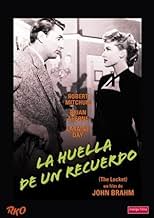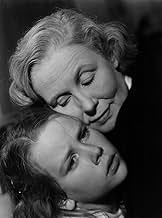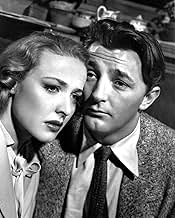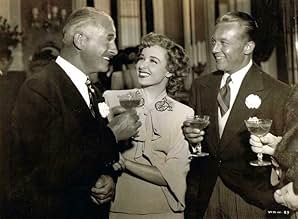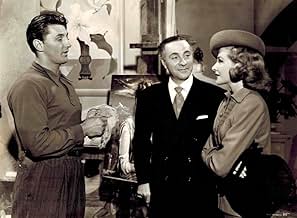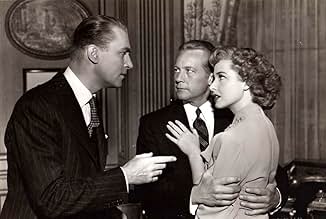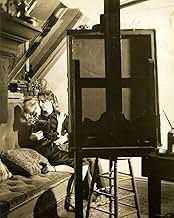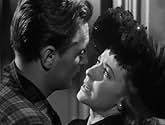IMDb-BEWERTUNG
7,1/10
3415
IHRE BEWERTUNG
Füge eine Handlung in deiner Sprache hinzuJust before his wedding, the bridegroom hears a complex tale painting his lovely bride as devilish and unbalanced.Just before his wedding, the bridegroom hears a complex tale painting his lovely bride as devilish and unbalanced.Just before his wedding, the bridegroom hears a complex tale painting his lovely bride as devilish and unbalanced.
- Regie
- Drehbuch
- Hauptbesetzung
- Auszeichnungen
- 4 wins total
Helene Thimig
- Mrs. Monks
- (as Helen Thimig)
Mari Aldon
- Mary
- (Nicht genannt)
Polly Bailey
- The Cook
- (Nicht genannt)
Empfohlene Bewertungen
I give full credit to this little treat for introducing me to the world of noir cinema when I happened to stumble onto it on AMC. (Oh, that AMC showed films of this caliber lately!) Laraine Day gives a beautifully understated performance, handling what would now perhaps be called a tragic case of posttraumatic stress disorder resulting in a life of twists and turns with truth, no scenery chewing. Brian Aherne strikes just the right clinical note as the sadder-but-wiser exhusband, and Robert Mitchum gives a memorable performance as the first (at least the first chronicled in this tale) man to fall victim to Nancy's fatal charms. As Norman, he certainly delivers a farewell present to Nancy's physician spouse, and by extension, to Nancy, that they won't soon forget. The denouement at the mansion while wedding guests await fair Nancy is gripping cinema. Watch for a great performance by the mother of Joan Fontaine and Olivia Dehaviland as the cruel woman responsible for Nancy's childhood trauma. Worth the while!
Having recently watched John Brahms' two preceding movies, both centring on psychologically disturbed men (killers in fact) in period features, here the director presents us with an emotionally unstable woman in a contemporary setting. I enjoyed the two earlier films "The Lodger" and "Hangover Square" and I enjoyed this one too.
The lead character is played by Laraine Day, whose beauty attracts men like honey to a bee, although little do they know that she is a closet kleptomaniac with slippery fingers around rich folk's jewellery, her condition traceable to a childhood incident when she covets an expensive locket given to her by the rich little girl whose house her mother serves, but taken back away from her by the girl's mother as too good for her. When the locket later goes missing she is menacingly if mistakenly accused by the mother and given to believe that her shame at this has coloured her future conduct as an adult. Not only do her good looks attract the interest of deep men like Robert Mitchum's artist and Brian Aherne's doctor, it all climaxes in a super-charged betrothal scene to her third beau, the very rich Gene Raymond whose mother's nuptial gift to her of a locket finally unlocks years of denial and guilt on her part.
I'd have to say that the plot certainly overdoes the Freudian associations of Day's Cassandra-like obsession with jewellery. I also couldn't quite imagine Mitchum firstly as a tortured artist and secondly taking the extreme action he does as he gives up Day to Aherne, while the final coincidence of the other locket was just a bit too much to swallow.
Nevertheless, it was again stylishly directed by Brahm with strong performances by Day as the beguiling magpie Nancy, as adept at stealing men's hearts as old folk's jewellery, Aherne as the duped doctor and even Mitchum, miscast as he was. The layered flashbacks I found intriguing while the use of dramatic lighting, staging and music added greatly to the suspense.
1940's Hollywood movies were awash with psychologically disturbed individuals in films from Citizen Kane on down and while this particular feature overdoes the angst more than a bit, it was none the less entertaining for all that.
The lead character is played by Laraine Day, whose beauty attracts men like honey to a bee, although little do they know that she is a closet kleptomaniac with slippery fingers around rich folk's jewellery, her condition traceable to a childhood incident when she covets an expensive locket given to her by the rich little girl whose house her mother serves, but taken back away from her by the girl's mother as too good for her. When the locket later goes missing she is menacingly if mistakenly accused by the mother and given to believe that her shame at this has coloured her future conduct as an adult. Not only do her good looks attract the interest of deep men like Robert Mitchum's artist and Brian Aherne's doctor, it all climaxes in a super-charged betrothal scene to her third beau, the very rich Gene Raymond whose mother's nuptial gift to her of a locket finally unlocks years of denial and guilt on her part.
I'd have to say that the plot certainly overdoes the Freudian associations of Day's Cassandra-like obsession with jewellery. I also couldn't quite imagine Mitchum firstly as a tortured artist and secondly taking the extreme action he does as he gives up Day to Aherne, while the final coincidence of the other locket was just a bit too much to swallow.
Nevertheless, it was again stylishly directed by Brahm with strong performances by Day as the beguiling magpie Nancy, as adept at stealing men's hearts as old folk's jewellery, Aherne as the duped doctor and even Mitchum, miscast as he was. The layered flashbacks I found intriguing while the use of dramatic lighting, staging and music added greatly to the suspense.
1940's Hollywood movies were awash with psychologically disturbed individuals in films from Citizen Kane on down and while this particular feature overdoes the angst more than a bit, it was none the less entertaining for all that.
Just before his wedding to the beautiful and carefree Nancy, John Willis is visited by Doctor Harry Blair who informs him that he knows the real Nancy and warns the doctor not to make the same mistake as him by marrying her. He tells her the story of how he had just married Nancy when a man called Clyde turned up in his office and told him a story about how he had met Nancy and had got drawn into her world of deception.
Shunning conventional structure is always a risk and in this film it is one that it takes as we have a story being told by Blair that is basically about him being told a story by Clyde. This makes for an interesting approach especially since the stories are both told by her dumped lovers. In this regard we're not sure what is true and what isn't and, while the stories engage on one level, I was conscious of the fact that they were telling and not necessarily facts (a trick Usual Suspects would later repeat to great praise). Existing within the minds of the characters, the story is interesting and is all the better at the end for it. For many viewers the story-telling approach will be a little slow and I times it did drag a bit but mostly it comes together and works as something different and interesting.
The cast are roundly good although they take second fiddle to the script and the ideas of director Brahm (who produces some clever ideas in Nancy's bridal march). Aherne is a bit too stiff in the role where really I wanted him to display a bit more range. Mitchum is good in his role but it wasn't the sort of thing I was used to seeing him in and he has been much better elsewhere. Day takes the main role of Nancy and does well with it she is part of the reason we're not sure what is true and what isn't and she convinced me that she didn't know either. She has plenty of nice touches as well as one or two very strong moments. Like I said though, this wasn't a great actors film but nobody was less than good.
Overall this is an interesting and different film that takes a risk by stepping back to flashback within flashback but mostly pulls it off. The story format might be a little testing on the patience (hearing about something implies a lack of action in the time where we are after all the audience spent the film in the Willis study) but the material is worth it and, once back in the present, everything comes together nicely. Worth seeing for being a different style of drama from the period.
Shunning conventional structure is always a risk and in this film it is one that it takes as we have a story being told by Blair that is basically about him being told a story by Clyde. This makes for an interesting approach especially since the stories are both told by her dumped lovers. In this regard we're not sure what is true and what isn't and, while the stories engage on one level, I was conscious of the fact that they were telling and not necessarily facts (a trick Usual Suspects would later repeat to great praise). Existing within the minds of the characters, the story is interesting and is all the better at the end for it. For many viewers the story-telling approach will be a little slow and I times it did drag a bit but mostly it comes together and works as something different and interesting.
The cast are roundly good although they take second fiddle to the script and the ideas of director Brahm (who produces some clever ideas in Nancy's bridal march). Aherne is a bit too stiff in the role where really I wanted him to display a bit more range. Mitchum is good in his role but it wasn't the sort of thing I was used to seeing him in and he has been much better elsewhere. Day takes the main role of Nancy and does well with it she is part of the reason we're not sure what is true and what isn't and she convinced me that she didn't know either. She has plenty of nice touches as well as one or two very strong moments. Like I said though, this wasn't a great actors film but nobody was less than good.
Overall this is an interesting and different film that takes a risk by stepping back to flashback within flashback but mostly pulls it off. The story format might be a little testing on the patience (hearing about something implies a lack of action in the time where we are after all the audience spent the film in the Willis study) but the material is worth it and, once back in the present, everything comes together nicely. Worth seeing for being a different style of drama from the period.
This film by underrated director John Brahm is one of the more interesting works of the 1940s (not one of the best, but different).
Laraine Day plays Nancy, about to marry and hiding some dark secrets in her past. She was excellent at this kind of thing. Gene Raymond (not the most charismatic of actors but surprisingly good here) plays her intended, with Brian Aherne as the psychiatrist who knows about her previous life.
In flashback we see Nancy and her husband (a young Robert Mitchum) and then into another flashback (daring to attempt this at the time when many films were still pursuing conventional structure).
'The Locket' of the title obviously holds the key to the mystery, and we have an absorbing time pulling all the loose ends together. Reginald Denny, Ricardo Cortez, and Ellen Corby decorate an accomplished cast.
Laraine Day plays Nancy, about to marry and hiding some dark secrets in her past. She was excellent at this kind of thing. Gene Raymond (not the most charismatic of actors but surprisingly good here) plays her intended, with Brian Aherne as the psychiatrist who knows about her previous life.
In flashback we see Nancy and her husband (a young Robert Mitchum) and then into another flashback (daring to attempt this at the time when many films were still pursuing conventional structure).
'The Locket' of the title obviously holds the key to the mystery, and we have an absorbing time pulling all the loose ends together. Reginald Denny, Ricardo Cortez, and Ellen Corby decorate an accomplished cast.
This is a great movie! I wasn't expecting to like it but boy, was I in for a suprise. The flashback within a flashback within a flashback (Is there another one?) theme is so great and is never the least bit confusing. Laraine Day, Brian Aherne, Robert Mithchum, and Gene Raymond give great performances in this thriller.
Wusstest du schon
- WissenswertesNorma Barzman's lengthy treatment for this film, which Sheridan Gibney revised into a screenplay, was inspired by a true event which was recounted to her by financier George Peabody Gardner and his sister Belle. When younger, the Gardners eschewed their aristocratic upbringing partly in reaction to an incident in their youth: As children they became friendly with the daughter of the family's housekeeper. It transpired that the daughter was wrongly accused of stealing a locket, leading to the firing and departure of the housekeeper and her daughter. Years later, they learned that the daughter suffered from depression and was implicated in a theft, a consequence for which the Gardners felt their family was partly responsible.
- PatzerAmerican ambulances, shown driven with left-hand drive, were not used in wartime London.
- Zitate
Norman Clyde: I don't take money for nothing. I'm not conducting a class so the parasitic rich can escape boredom. I'm not that hard up.
Nancy Patton: Well, I hope you never will be, Mr. Clyde. I admire your principles. I wish I could say the same for your disposition.
- VerbindungenEdited into Geschichte(n) des Kinos: Fatale beauté (1994)
Top-Auswahl
Melde dich zum Bewerten an und greife auf die Watchlist für personalisierte Empfehlungen zu.
- How long is The Locket?Powered by Alexa
- What makes this film a one of the great "Film Noir" of its day ?
Details
- Erscheinungsdatum
- Herkunftsland
- Sprache
- Auch bekannt als
- What Nancy Wanted
- Drehorte
- Produktionsfirma
- Weitere beteiligte Unternehmen bei IMDbPro anzeigen
- Laufzeit1 Stunde 25 Minuten
- Farbe
- Seitenverhältnis
- 1.33 : 1
Zu dieser Seite beitragen
Bearbeitung vorschlagen oder fehlenden Inhalt hinzufügen


